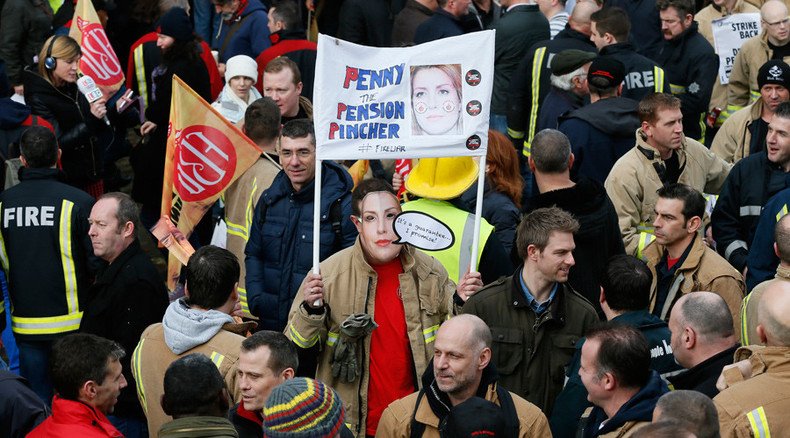‘UK’s new strike laws like Nazi Germany’ – union leader

The leader of Britain’s biggest union, Unite, has compared Tory strike laws that would require workers to wear armbands on the picket line to the Nazis’ persecution of trade unionists.
Speaking at the Labour Party Conference in Brighton on Monday, Unite general secretary Len McCluskey warned that his members would not comply with the proposal in the Trade Union Bill.
He told the conference it was reminiscent of when the Nazis made trade unionists wear armbands with red triangles in concentration camps.
The controversial legislation plans to raise the minimum turnout for strike ballots to 50 percent, with public sector strikes require at least 40 percent of those eligible to vote.
Under current legislation a strike can take place if it is backed by a simple majority of union members who vote, regardless of turnout.
It has been fiercely attacked by trade unions as undemocratic and a threat to organized labor.
Jeremy Corbyn described the bill as a “threat to all of us” in his first speech as Labour Party leader to the Trade Union Congress (TUC) earlier this month. He vowed the party would fight the legislation “all the way.”
Speaking to delegates at the Labour conference, union chief McCluskey compared the requirement for striking workers to wear armbands on the picket line to the Nazis’ treatment of trade unionists in concentration camps.
“I will be on the picket line when Unite members are on strike and I will not be wearing an armband with a red triangle like the trade union prisoners,” he said.
“Conference, remember, that’s what the Nazis did – trade unionists in the concentration camps of Dachau – made to wear armbands with red triangles. We won’t be doing that.”
McCluskey challenged the government’s planned ballot thresholds and proposed instead the voting system be modernized.
“If your concern about turnout in strike ballots is genuine, then scrap the archaic and undemocratic reliance on postal ballots and give trade unionists the right to secure, secret, workplace balloting,” he said.
“Modernize the voting system and there will no longer be a turnout problem. If ministers agree then we can reach an agreement on thresholds.”
Union leaders have repeatedly called for secret balloting, with TUC chief Frances O’Grady proposing online voting on industrial action. Under current law, strike balloting must take place by postal vote.
The Trade Union Bill passed its second reading by 33 votes earlier this month, despite strong opposition from Labour MPs.
If the bill passes into law, it will enact several new restrictions on strike action, including doubling the notice period unions must give before a strike can be held from seven to 14 days.
It will also allow employers to use agency workers to replace striking staff and end the “check-off” system whereby unions can collect fees directly from a salary.
The bill is opposed by Labour, the Scottish National Party and a handful of outspoken Tories, including former Shadow Home Secretary David Davis.
Business Secretary Sajid Javid insists the legislation is necessary to stop “endless” threats of industrial action.
“None of these changes are about banning strikes, but we need to get the balance right between the interests of unions and the interests of the majority of people who rely on important public services,” a spokesperson for the Department of Business said.
“These modernizing reforms will ensure strikes only happen as a result of a clear, positive decision by those entitled to vote.”












